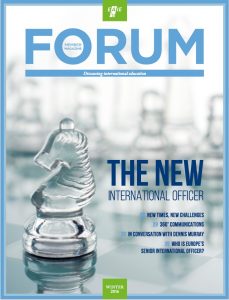
Francisco Jariego, a member of the Innovation Council of IFI, and Totti Könnölä, CEO of Insight Foresight Institute (IFI), write in Cinco Días (one of the leading economic journals in Spain) about the transformation in the automotive industry driven by technological advances and the platform economy.
Smartphones have opened the possibility of sharing vehicles in a simple way. Uber and others have developed platforms that connect drivers and passengers, making it possible to find a driver or share a car with just a one click. These companies are pushing for a change in the patterns of private car use, which will have important consequences.
The electric vehicle is reaching the levels of autonomy and cost that make it competitive with the vehicles of internal combustion. Tesla has strongly encouraged the development of this type of vehicle with a huge investment in the production of electric batteries and a coordinated bet on the development of solar energy.
The autonomous vehicle begins to be accepted as a real possibility in a not too distant future. After years of investing in the technologies that will make a driverless vehicle possible, what began as a highly speculative bet from Google (a moonshot) is, since late 2016, a new business unit, Waymo, under the umbrella of Alphabet.
Read the full article in CincoDias in Spanish.
 Luis Delgado and Totti Könnölä (CEO of IFI) write in the EAIE Magazine on the role of international officers in Spanish universities. The analysis of job offers for international officers in higher education in Spain leads to the conclusion that their main goal is to support the recruitment of international students. They often work within recruitment teams, managing sales channels for specific regions to fulfil the university´s recruitment objectives. Nowadays, however, the concept of internationalisation of higher education should go far beyond student recruitment, the mere mobility of student, or the signing of international agreements. There is much more to a career in international higher education!
Luis Delgado and Totti Könnölä (CEO of IFI) write in the EAIE Magazine on the role of international officers in Spanish universities. The analysis of job offers for international officers in higher education in Spain leads to the conclusion that their main goal is to support the recruitment of international students. They often work within recruitment teams, managing sales channels for specific regions to fulfil the university´s recruitment objectives. Nowadays, however, the concept of internationalisation of higher education should go far beyond student recruitment, the mere mobility of student, or the signing of international agreements. There is much more to a career in international higher education! Juan Mulet, the member of IFI Innovation Council writes in Cinco Dias, one of the leading economic daily papers in Spain on how innovation, purchase and employment are, or should be, connected.
Juan Mulet, the member of IFI Innovation Council writes in Cinco Dias, one of the leading economic daily papers in Spain on how innovation, purchase and employment are, or should be, connected. A lot of businesses within the digital economy are structured around the so called digital platforms. Apple, Google, Amazon and Facebook are platforms, and up to a 70% of the new unicorns, with Uber leading them, as well. In USA and Asia the companies based in platforms represent a substantial part of the new digital economy. Surprisingly, Europe, contributes just a 4% in the total capitalization of the global platforms.
A lot of businesses within the digital economy are structured around the so called digital platforms. Apple, Google, Amazon and Facebook are platforms, and up to a 70% of the new unicorns, with Uber leading them, as well. In USA and Asia the companies based in platforms represent a substantial part of the new digital economy. Surprisingly, Europe, contributes just a 4% in the total capitalization of the global platforms. A reflection of the almost finished year: at the same time that the Cotec Foundation for Innovation celebrated its “the must” spring event, near Seseña a tyre bonfire was burning full flame. Those lost tyres could have become a business opportunity, an important service for our community and to the environment. Since the 70s the MIT professor Nichols Ashford, and more recently, Andrea Renda, from the CEPS European think tank, find evidence that an adequate regulation can create innovation, particularly to face the grand societal challenges. On the contrary, an inappropriate regulation can not only worsen the emerging opportunities, but prevent the potential innovators, professionals and entrepreneurs to innovate at all.
A reflection of the almost finished year: at the same time that the Cotec Foundation for Innovation celebrated its “the must” spring event, near Seseña a tyre bonfire was burning full flame. Those lost tyres could have become a business opportunity, an important service for our community and to the environment. Since the 70s the MIT professor Nichols Ashford, and more recently, Andrea Renda, from the CEPS European think tank, find evidence that an adequate regulation can create innovation, particularly to face the grand societal challenges. On the contrary, an inappropriate regulation can not only worsen the emerging opportunities, but prevent the potential innovators, professionals and entrepreneurs to innovate at all.